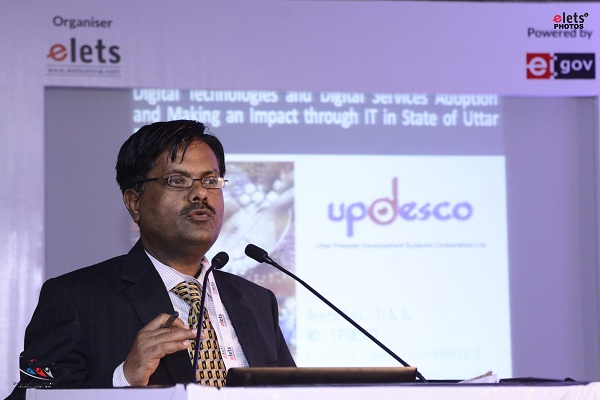
Most of the hand pumps, ponds and wells in Banda district were lying in a state of neglect as the community connect to preservation and upkeep of these community water sources has been lost culturally. This led to a major slum in groundwater levels, especially during summers, writes Dr Heera Lal, Additional Mission Director, National Health Mission, Uttar Pradesh.
Dropping Groundwater Levels in Banda
The groundwater fluctuations and groundwater depletion rates are high in Banda due to neglection from the locals and this resulted in seasonal acute water scarcity in most parts of the district. The scenario had unreliable hand pumps, dried ponds and wells, particularly during summer months adding to the agony of people facing water stress for household and community needs.

As per Ground Water Year Book published by Central Ground Water Board (2015-16), there are 14 observation wells in Banda. The maximum range of fluctuation is 3.20 m of inclination in the level and a drop of 5.26 m annually indicating high seasonal variability in the availability of water in wells. Overall, about 71 percent of the wells are showing groundwater depletion with 50 percent wells showing 0-2 m, seven percent showing 2-4 m and 15 percent showing more than 4 m depletion annually. Thus, the situation related to groundwater usages and effects was truly alarming in Banda and requires a massive awareness, campaign and interventions for groundwater recharge to reduce the threats to groundwater security.
Corrective Measures

The initiative of ‘Bhujal Badhao’, ‘Peyjal Bachao Abhiyaan’ and ‘Kuwa Taalab Jiao Abhiyaan’ successfully induced a socio-behavioural change among the masses, taking roots as ‘Jal-Aandolan’ and transforming into a ‘Jan-Aandolan’. The movement helped to achieve all the set objectives and our sustained efforts will completely eradicate the water crisis in Banda.
Also Read: Awareness among citizens and govt’s proactiveness can answer India’s water crisis
At the inception of ‘Bhujal Badhao’, ‘Peyjal Bachao Abhiyaan’, Banda adopted a water budgeting tool developed by WaterAid India and Akhil Bhartiya Samaj Seva Sansthan (NGO) under the campaign by the District Administration. The water budgeting tool uses ‘ Jal Chaupal’ model.
The campaign which was conducted between January to March 2019 saw a participation of 34,732 people who participated in ‘Jal Chaupal’ from all eight blocks. The participants were directly made aware about their water budget (demand and supply), rates of groundwater depletion of various strata and changes in rainfall patterns observed by the community over a period of last 20 years. This also triggered the community action towards ‘shramdaan’ for digging contour trenches for groundwater recharge around wells and hand pumps as per technical designs prepared under the Phase -1 of the campaign. As a result 2605 contour trenches have been constructed by community members around 260 wells and 2183 hand pumps across 470 Gram Panchayats in Banda district.
Further, the district administration made giant efforts to upscale the campaign, buoyed by the success of Phase-1 of the campaign. Therefore, Phase-2 of the campaign which was conducted between April to February 2020 namely ‘Kuwa Taalab Jiao Abhiyaan’ started targeting massive campaign and ‘Jal Chaupals’ around wells and Ponds by the team of district administration and different stakeholders.
In the Phase-2, ‘Jal Chaupals’ were conducting puja and reviving a culture of respect towards water bodies in rural masses, which was a part of the long cultural history of Bundelkhand. Technical models for the construction of contour trenches, rainwater harvesting in wells and rehabilitation of ponds were developed and disseminated through public campaigns, booklets and posters in simple language so that we can educate the community at the grassroots level.
Different activities for creating awareness, motivating and engaging communities with water were organised in the district such as ‘Jal March’, ‘Deep Daan’, ‘Jal par Kavita & Mushaira Sammelan’, Tree plantation & ‘Medbandi’, River Ken ‘Aarti’, ‘Jal Hasya Charchaetc’.
As a result of the Phase 2 Campaign, rehabilitation and digging of 572 minor irrigation ponds/gram panchayat’s ponds (under MGNREGA and Gram Nidhi), construction of 840 farm ponds (Khet Taalaab), 82 rooftop rainwater harvesting cum recharge pit structures at different government buildings, 1536 trench/recharge pits at primary/upper primary school buildings/degree college buildings, 1311 Medbandi related work at agriculture land conducted, community action towards digging of ponds and wells was also triggered.
Also Read: Banda DM Heera Lal launches Campaign to Curb Water Crisis
Banda Campaign work has been acknowledged at different platforms at the national level:
- Best Water Project – Smart Cities India Awards
- Habitat for Humanity India Innovation & Impact Award
- Limca Books Of Records
- Rajat Ki Boonden National Water Award
- Elets National Water Innovation Awards
To ensure its success, Banda administration has adopted a collaborative approach and prioritized mass-ownership as the fundamental strength, starting-off by creating a formal district-level Water Committee comprising of key officials from all water-related departments, civil society members and technical water experts.
Be a part of Elets Collaborative Initiatives. Join Us for Upcoming Events and explore business opportunities. Like us on Facebook , connect with us on LinkedIn and follow us on Twitter, Instagram.











